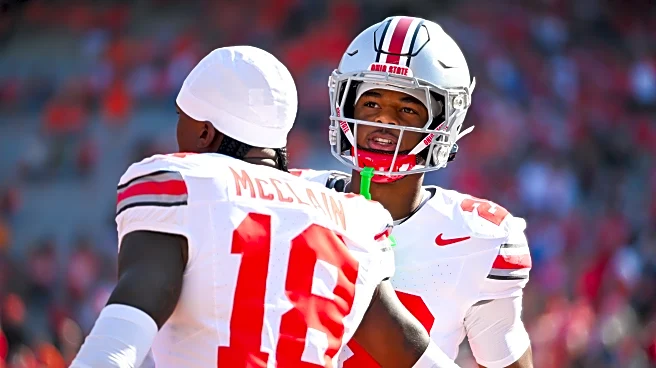What's Happening?
The film 'Roofman,' directed by Derek Cianfrance, features Channing Tatum as Jeffrey Manchester, a homeless fugitive who becomes known for his unique method of committing robberies. Manchester, portrayed with charm by Tatum, is depicted as a criminal who breaks into McDonald's restaurants by entering through the roof, locking employees in coolers, and ensuring their comfort by offering them his coat if needed. The film focuses on Manchester's life after his arrest, highlighting his escape from jail and subsequent life hiding in a Toys R Us store in Charlotte, North Carolina. The narrative explores his relationship with a local woman, Leigh Wainscott, played by Kirsten Dunst, and his attempts to provide for his family through illegal means.
Why It's Important?
The film 'Roofman' taps into the American fascination with anti-heroes, similar to historical figures like Bonnie and Clyde. It challenges audiences to empathize with a character who, despite his criminal activities, is portrayed as a caring father and partner. This portrayal raises questions about morality and the lengths individuals go to provide for their families. The film also highlights the struggles of veterans, as Manchester is depicted as a U.S. Army veteran dealing with personal demons. By casting a popular actor like Channing Tatum, the film aims to draw attention to these complex social issues while entertaining audiences.
What's Next?
The release of 'Roofman' is likely to spark discussions about the portrayal of criminals in media and the ethical implications of romanticizing such figures. It may also lead to further exploration of the challenges faced by veterans in society. The film's success could influence future projects by director Derek Cianfrance and actor Channing Tatum, potentially leading to more collaborations that explore similar themes.
Beyond the Headlines
The film's depiction of Manchester's life in a Toys R Us store touches on themes of consumerism and the American dream, as he turns the store into his personal domain. This setting serves as a metaphor for the unattainable desires and the lengths people go to achieve them. The film also raises questions about the justice system and the rehabilitation of criminals, as Manchester's story is one of repeated cycles of crime and punishment.










